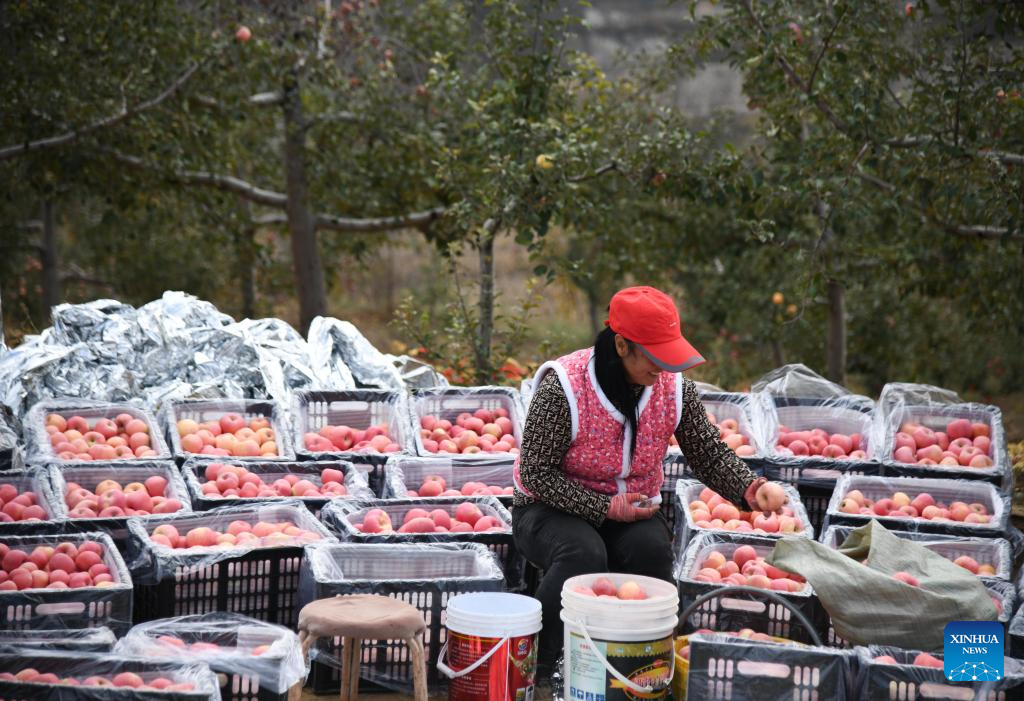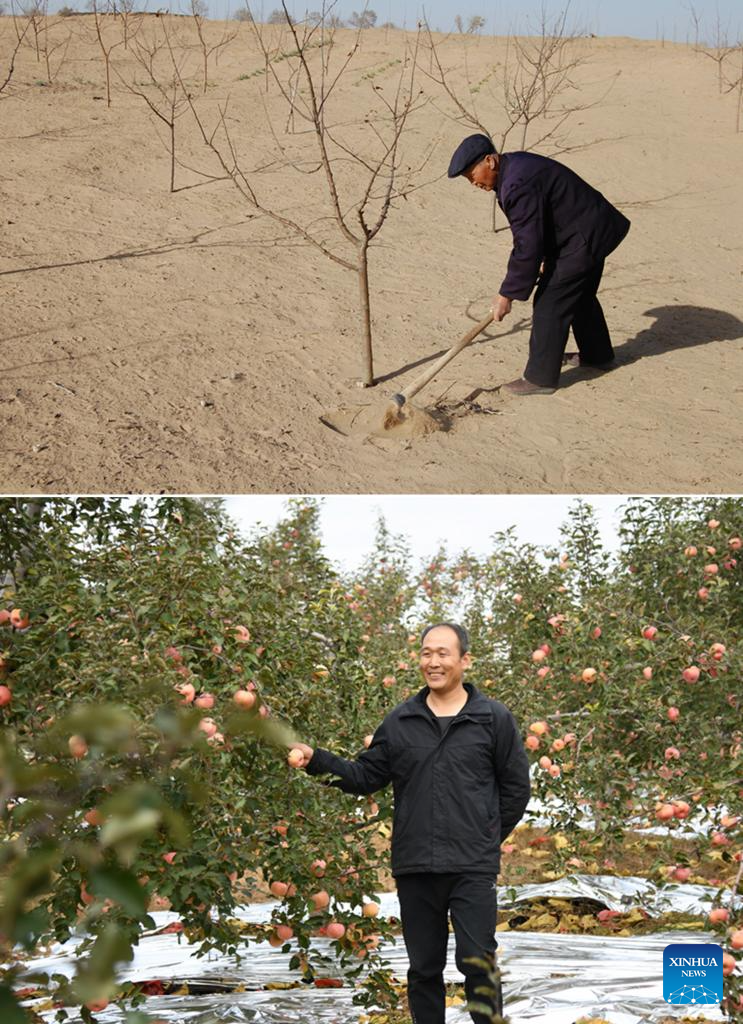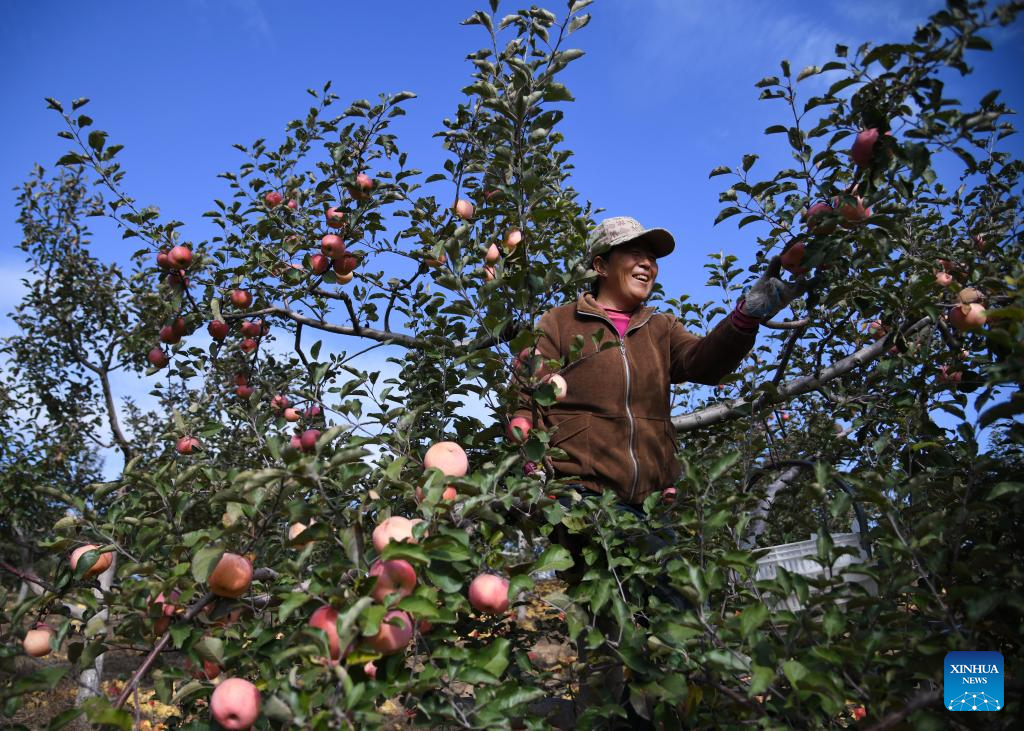Across China: Where sand once blew, apple harvest in full swing
Source: Xinhua
Editor: huaxia
2025-11-13 19:46:00

A farmer sorts apples at an orchard in Zhaoshipan Town of Hengshan District in Yulin City, northwest China's Shaanxi Province, Nov. 4, 2025. (Xinhua/Zhang Bowen)
XI'AN, Nov. 13 (Xinhua) -- Against the rolling mounds along the southern edge of one of China's major deserts -- Maowusu, an apple harvest is in full swing. Farmers move through neat rows of trees, their baskets filling with fruit that gleams in the warm autumn light.
It's a scene of abundance that would have been unthinkable just twenty years ago, when this land in northwest China's Shaanxi Province was still known as the "barren sand ridges."
The transformation is part of a quiet agricultural revolution -- the striking northward march of Shaanxi's apple belt, stretching hundreds of kilometers into what was once unyielding desert.
"Shaanxi's traditional apple-growing areas were concentrated in the area north of the Weihe River. In recent years, the planting zone has expanded northward all the way to the Maowusu Desert," said Zhao Guangzhu, director of the provincial fruit industry center. Today, that expansion means one in every four apples grown in China now comes from Shaanxi.
The story of this expansion is written in the weathered face of 85-year-old Zhang Binggui. In 2003, after retiring, he leased 300 mu (20 hectares) of sandy land in a township of Yulin City, determined to make something grow. His early experiments with grapes and date trees ended in failure, drawing laughter from neighbors who dismissed his work as "a pointless effort." Undeterred, Zhang's perseverance led him to shift his focus to apples.
"Rash launches are doomed to fail -- we need sci-tech driven approaches," Zhang said, recalling his years of trial and error. He eventually pioneered techniques for sandy soil, from building irrigation systems to amending the earth with fermented sheep manure, boosting sapling survival rates from a meager 30 percent to over 97 percent.
His family, including his grandson Zhang Bin, has now taken up the mantle, returning to their hometown to expand sales through e-commerce and bring their sandy land apples to the national market. "This year's yield is up again," Zhang Bin said. "We expect profits of over 300,000 yuan (about 42,334 U.S. dollars)."
The 2020 movie "My People, My Homeland" featured a character who toiled to grow "sandy land apples" in the Maowusu Desert, hoping to build a better home -- a storyline inspired by Zhang Binggui's real-life journey. Thanks to the movie's widespread popularity, an increasing number of people in China have come to recognize and appreciate this unique variety of apples.
This northward march is not just a story of human perseverance, but also one written by the changing climate. Data from the Yulin meteorological bureau reveals a striking shift: between 2010 and 2024, the city's average annual rainfall rose, temperatures climbed by 1.5 degrees Celsius and the frost-free season lengthened by 54 days.
"The apple belt's reach into the Maowusu Desert is the product of ecological restoration, climate change and technological progress," said Zhao Zhengyang, a tech expert in the provincial apple industry.
Local government policies have accelerated progress. In recent years, Yulin has seized the momentum of Shaanxi's broader push to expand apple cultivation into new frontiers in the north and west, making the fruit a cornerstone industry for rural revitalization.
The results are tangible across the region. In Shenmu, a county-level city administered by Yulin and once notorious for barren fields and failed harvests, nearly 8,000 mu of hillside orchards now thrive. "It used to be impossible to grow grain here," said Wang Mingwei, who manages a 900-mu orchard in Hejiachuan Township. "This year's apple yield will exceed 150,000 kilograms."
Dingbian County in Yulin has adopted a cooperative-led approach, developing 6,000 mu of apple orchards. "We're focusing on frost prevention, standardized management and brand building to make apples a true pillar of rural revitalization," said Liu Ruxia, deputy director of the county's horticultural technology promotion center.
The ecological gains are as profound as the economic ones. Decades of afforestation, including the vast Three-North Shelterbelt Forest Program, have stabilized 8.6 million mu of once-drifting sand in Yulin. Today, the city's new orchards, covering over 1 million mu, not only further anchor the soil but also help temper the local climate.
Once known for its vast stretches of shifting dunes, the Maowusu Desert is now turning green. Today, nearly 80 percent of the area has been restored. By 2020, 93.24 percent of Yulin's desertified land had been brought under control. Among China's four major sandy lands, Maowusu stands out as a story of remarkable revival -- a living testament to the country's evolving strategies and technologies in combating desertification.
"China is one of those countries that really are extremely advanced in terms of land restoration in many of these deserts," said Ibrahim Thiaw, former executive secretary of the United Nations Convention to Combat Desertification.
Xue Pengcheng, former head of the Yulin environmental monitoring station, noted that sustained ecological restoration has created the conditions for apples to move north.
Technology is ensuring that Yulin's apples can hold their own in the market. The region has introduced high-quality locally cultivated varieties such as "Ruixue" (snow apples) and "Qincui" (Shaanxi crisp apples), while promoting new technologies like water-fertilizer integration and pest control.
The region's natural advantages -- long hours of sunshine and wide temperature swings between day and night -- give the fruit its distinctive flavor and crispness, with some premium Qincui apples fetching as much as 15 yuan each.
With 500,000 mu of young trees still approaching full yield, the industry's value is set to keep climbing.
"From my experience," Zhang Binggui said with quiet confidence. "as the climate improves and sand-farming techniques advance, mountain apples could move another hundred kilometers deeper into the Maowusu Desert." ■

This combo photo shows Zhang Binggui (above) works in an orchard in Zhaoshipan Town of Hengshan District in Yulin City, northwest China's Shaanxi Province, in 2009 and Zhang Bin (below), grandson of Zhang Binggui, checking the growth of apples in Zhaoshipan Town on Nov. 4, 2025. (Xinhua)

A farmer harvests apples at an orchard in Zhaoshipan Town of Hengshan District in Yulin City, northwest China's Shaanxi Province, Nov. 4, 2025. (Xinhua/Zhang Bowen)



